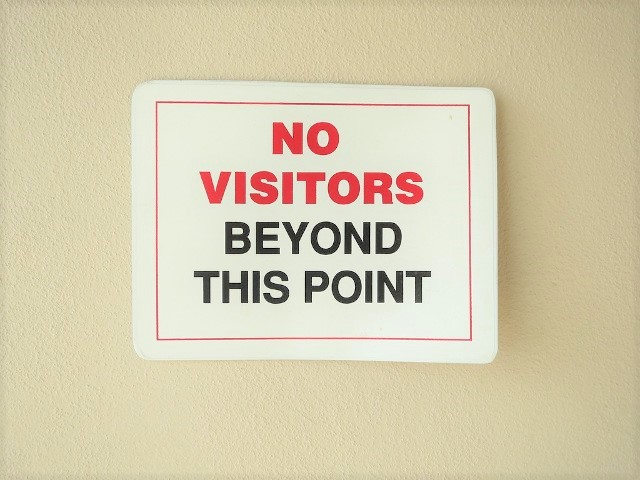Last updated on November 9th, 2022 at 10:12 am
There are a lot of myths out there about what landlords can and cannot do. So you’ve moved into your dream apartment or are renting a room in a house, and you’re wondering “can a landlord ban someone from the property?” Yes, they can.
There are some reasons why a landlord might want to ban someone from the property, ranging from disruptive behavior to just looking suspicious. However, if it’s not outlined in the lease or there is no qualifying legal reason, a landlord has no right to ban someone from the property. If they do ban someone, the tenant will likely be able to challenge the ban in court.
However, if the landlord does have a valid reason for wanting to ban someone from the property, they will need to follow the proper legal channels to do so. Each state has its landlord-tenant laws, so you must stay updated on your state’s laws to avoid a possible ban on you or your guests.
Can a Landlord Say No Overnight Guests?
The answer to this question depends on the state in which you live and the type of lease you have. The Federal Fair Housing Act prohibits landlords from discriminatory acts in housing, but it does not address the landlord restricting guests from overnight stays.
If your lease says you cannot have overnight guests, your landlord can say no to guests. If it’s not on your lease, it’s up to your landlord. If you’re unsure about your landlord’s guest policy, you should ask them.
If you live in a state with a law regulating overnight guests, then the law will dictate whether or not your landlord can say no to guests. For example, a landlord cannot unreasonably refuse to allow a tenant to have an overnight guest in California. However, the landlord can set reasonable limits on the number of guests, the length of the stay, and the time of day guests can visit.
Tenants Rights to Have Guests

In every state, there are laws to protect a tenant’s right to have guests. These laws vary from state to state, but some general principles apply in most cases. Here are five things you should know about your tenants’ rights when having guests.
- You have the right to have guests stay with you for a reasonable period.
- You are responsible for the behavior of your guests. For example, you may be liable if they damage property or disturb other tenants.
- You do not have to notify your landlord if you are having a guest stay with you for less than a week.
- You should inform your landlord in advance if you are expecting guests who will stay for an extended period.
- Your landlord may impose reasonable restrictions on the number of guests you can have at a time.
These are just some things you should know about your tenants’ rights when having guests. You should consult your state’s laws or speak with an attorney for more information.
Can a Landlord Tell You How to Live?
This is a valid question! After all, when renting a property, you are essentially living in someone else’s home. So it stands to reason that they would have some say in how you live your life, right?
Wrong.
A landlord cannot tell you how to live. They can’t tell you when to be home, what to wear, who to invite over, or anything along those lines. That’s not to say that they can’t set some basic rules – like no smoking or no pets – but they can’t dictate how you live your life.
So if you’re ever in a situation where your landlord is trying to tell you how to live, remind them that they can’t do that!
Can a Landlord Tell Other Tenants Your Business
First, you need to look at your lease agreement. Many leases will prohibit the landlord from disclosing personal information about tenants to other tenants. If this is the case, the landlord would likely violate the lease agreement if they told other tenants about your business.
However, even if your lease doesn’t have such a clause, the landlord may still be violating your privacy if they tell other tenants your business. This is because landlords have a general legal duty to keep their tenants’ information confidential. If the landlord tells other tenants your business, they could be liable for breaching this duty.
In some situations, the landlord may be forced to disclose information about a tenant to other tenants. For example, if a tenant is disruptive or engaging in illegal activity, the landlord may need to disclose this information to other tenants to protect their safety.
Landlord Harassing Guests: What to Do?

No one should put up with a landlord constantly harassing them or their guests. Unfortunately, this is a reality for many people. If you find yourself in this situation, there are some things you can do to protect yourself and your guests.
Keep a Record
First, try to keep a record of the harassment; if the landlord is being verbally abusive, get it on video. It is essential to document as much as possible. Keep a journal of every incident, including the date, time, and what was said or done. If there are witnesses to the harassment, get their contact information.
Talk With Your Landlord
Next, see if there’s a way to resolve the issue without involving the authorities. For example, maybe your guests can be a little more careful about where they park, or perhaps they can try to keep the noise down if you agree; great! But if not, you may have to take some further steps.
Call the Police
If talking to your landlord doesn’t work, you may need to contact the police. This is especially important if you or your guests are in danger. The police can help to diffuse the situation, and they may also be able to take legal action against your landlord if necessary.
Can a Landlord Tell You Who Can Be At Your House?
Unless your lease or rental agreement specifically says otherwise, your landlord likely cannot dictate who can visit or stay with you. This is considered an invasion of privacy and is not allowed under most lease agreements.
There are, of course, exceptions to this rule. For example, if you are disturbing other tenants with noisy visitors or parties, your landlord may be within their rights to ask you to tone it down or limit the number of people at your home. Additionally, your landlord may have to take action if your visitors engage in illegal activities.
